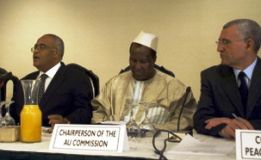AU mediators work on DOP document to end Darfur conflict
ABUJA, June 16 (AFP) — African mediators trying to end the civil war in Sudan’s Darfur region put a key Declaration of Principle (DoP) worked out with foreign partners to the warring parties for adoption.

|
|
Chairman of the African Union summit on Darfur crisis Salim Ahmed Salim (L) addresses participant while African Union secretary general Alpha Konare (C) 10 June 2005, during a summit on Darfur crisis in Abuja. (AFP). |
“We have held separate talks with both the representatives of the Sudan’s government and delegates from the two rebel groups — the Sudan’s Liberation Movement (SLM) and Justice and Equality Movement (JEM),” AU spokesman Nouredine Mezni told AFP.
“The plenary session to discuss and adopt the DoP may likely take place on Friday,” he said.
Sudan’s Minister for Humanitarian Affairs Mohammed Yousif Abdalla confirmed the development.
“The mediators have ended separate consultations with the parties. The next stage is to have a joint session on the document with a view to ratifying it. But I seriously doubt if that can take place today,” he said.
The African mediators had earlier held talks with foreign partners where a harmonised version of the DoP was produced for the adoption of the parties.
Mezni said the last three days had been spent discussing the submissions of the Sudanese government and one of the two rebel groups, the JEM.
The other rebel group, the SLM, which had requested more time to submit its views, did so late Wednesday.
“The stage is now set for full debate on the document with a view to adopting it,” Mezni had said.
The AU-mediated talks resumed Friday after a six-month suspension because of allegations of truce violations, but the warring parties have yet to get together outside initial plenary sessions.
International pressure is intensifying to end the war that has claimed between 180,000 and 300,000 lives and displaced some 2.4 million people, especially since the resolution last year of a separate conflict which had engulfed oil-rich south Sudan for more than two decades.
Fighting in Darfur broke out in February 2003 when an uprising representing the mainly black population of the region led Khartoum to unleash Arab militias known as Janjaweed, who have been accused of “ethnic cleansing”, torture, rape and intimidation.
AU mediators, with facilitators from Nigeria and Libya, have been exchanging views since Monday with officials from international bodies and donor nations including European countries and the United States.
A potential stumbling block emerged Wednesday when both rebel groups strongly opposed neighbouring Chad as a co-mediator, after a Chadian delegation turned up late Tuesday and became involved in the talks.
Chad, which has an eastern border with the region, hosts some 200,000 of those displaced. While the rebel groups opposed Chad’s participation, saying it is biased against them, Khartoum accepts its presence.
“The decision to have Chad as co-mediator was taken by the AU summit and we have to abide by that,” Abdalla said.
He said Sudan would also accept the possibility mooted by the AU of having Eritrea as an observer, although relations between the two are poor.
Sudan’s Finance and Economy Minister Omar Rahama said the government delegation was “fully mandated and totally committed to solve the crisis in Darfur once and for all, whether it is power sharing or wealth sharing.”
He appealed to “our brothers in the rebel movements to shed any doubt about the government’s sincerity for peace.”
The “partners” in the talks include the Arab League, the European Union, the United Nations, Britain, Canada and Egypt — Sudan’s Nile river neighbour to the north, with close historic ties — as well as France, Norway and the United States.
